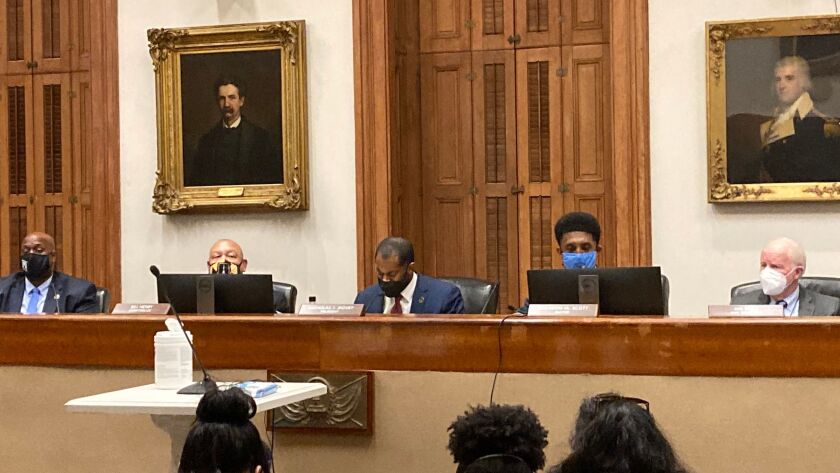Fed up with the machine politicians who controlled the council, state legislators voted in 1898 to rip budgeting power away from the body — leaving only the mayor the ability to both cut and add to the spending plan.
That charter amendment was coupled with others that also strengthened the power of the mayor, cementing the city’s strong-mayor status for decades to come. The mayor-controlled Board of Estimates was created, and the mayor’s term extended from two years to four.
Now, 125 years later, the pendulum is finally swinging back — but just a little.
Via a charter amendment approved by voters in 2020, Baltimore City Council will be able to both add and remove items from the city budget this year. Until now, the 15-member council could only cut funding. Mayoral approval was needed to reallocate any funds cut to different areas of the budget.
The long-awaited power boost comes as tensions have been running high between the council and Mayor Brandon Scott, prompting calls from some to curtail the mayor’s power. The two branches were at odds over Scott’s push to sign a maintenance agreement for the city’s conduit system with Baltimore Gas and Electric Co., a fight Scott ultimately won by wielding the considerable power of the Board of Estimates.
Council struck back, though, initially blocking approval of Faith Leach, Scott’s pick for city administrator. The group expressed few reservations about Leach herself but instead said they had unanswered questions about the position. Days later, after considerable lobbying by the Scott administration, members said their concerns were allayed and approved Leach’s nomination unanimously.
Councilman Eric Costello, chairman of the council’s Ways and Means Committee and council’s budget hearings, said the recent tensions between the mayor and council have no bearing on the group’s approach to the budget process this year.
“We have a job to do, and our job is to make sure we pass a responsible budget that reflects our city values,” Costello said. “That’s what we intend to do. We’re going to work in good faith with the administration to make sure we have the right budget.”

Lilly Price/TNS
Costello said the council has begun preparations for budget season early this year in anticipation of the new budgeting power. Leaders have been studying previous years’ budgets, compiling areas that are concerns for council members. The council plans to include qualitative performance measures as part of its analysis for individual agencies, Costello said.
Council President Nick Mosby has created a new director of budget and finance position to assist council with financial matters. Dexter Lockamy, who joined the staff last month, will be paid a $141,131 salary.
Mosby said he believes council’s additional budgeting power will be a “win for all of Baltimore.”
“We look forward to continued collaboration with the Scott administration to ensure that the necessary resources are available to have efficient and effective services in our city,” Mosby said. “This change is a great example of our efforts to be a partner in progress with the administration and our office remaining intentional about bringing a greater sense of professionalism to how we manage city finances together.”
Baltimore City Comptroller Bill Henry, who sponsored the budgeting charter amendment while still a member of the city council, called the budget the “single most powerful policy tool at the mayor’s disposal.” The effectiveness of the amendment, however, will depend on how organized the council is, he said.
“The council’s increased power over the budget is entirely collective. If they’re out there going after it half a dozen different ways with half a dozen different sets of priorities and agendas, it won’t be any different than it used to be,” Henry said. “But if they get themselves organized and have 10 of the 15 members or more with a common agenda, then they can completely reshape a budget.”
Costello said he’s confident the council will be able to find common ground.
“This is my seventh year chairing this process,” Costello said. “Every year, we’ve gotten a budget agreement done and found a way to work together.”
Matthew Crenson, an emeritus professor of history at the Johns Hopkins University, said the new structure might not be as drastic of a change as some expect. The council is still restricted to the total amount of money allocated in the mayor’s proposed budget. It can only move money around, not expand total spending.
However, when considered in conjunction with other recently approved charter amendments, the package represents the first shift in the power balance in many years, Crenson said.
As in 1898, when a package of charter amendments strengthened the power of the mayor, voters, spurred by outrage over former Mayor Catherine Pugh’s abuse of power, approved in 2020 a similar package that chipped away at the mayor’s power. Amendments included expanded budgeting power, a reduction in the votes needed to override a mayoral veto and the establishment of a city administrator position to manage the city’s day-to-day business. That position gives council the power to confirm the mayor’s nominee, but the council also has the power to ratify the mayor’s decision should they terminate an administrator.
If the recent sparring over Scott’s administrator nominee is any indication, the council could make the mayor’s life more difficult this budget season, even if the budgeting change is modest, Crenson said.
There’s always been some level of haggling over the budget between council and the mayor, even before the new council powers were adopted. And council has demonstrated a willingness recently to push back at the mayor, he said.
“That may happen with the budget, too,” Crenson said. “Even if they don’t differ on anything big, they could just flex their muscles.”
©2023 Baltimore Sun. Distributed by Tribune Content Agency, LLC.
Related Articles











